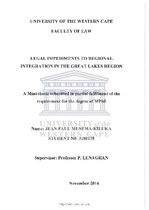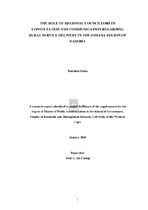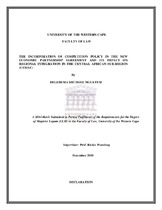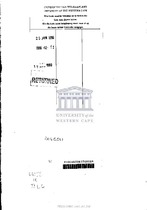Legal impediments to regional integration in the great lakes region
Abstract
The Great Lakes Region has long been viewed as a land of untapped economic
potential due to, amongst other factors, the failures of the Economic Community of the Great
Lakes Countries (ECGLC)1 and the Rwandan genocide. The region has many opportunities
and common initiatives despite tensions among its core countries. Cross-borders trade,
common infrastructures and common border security zones operations have shown that
regional integration is possible within the region.
From the Dar-Es-Salaam Conference and Declaration2 in November 2004, and
thereafter, the signing of the International Conference on the Great Lakes Region (ICGLR)
Pact3 in Nairobi, in 2006 the Group of Friends (GoFs) and the member states plus
international non-governmental organisations (NGOs) took a stance to build for the future of
the region. They created this new regional integration initiative in order to achieve peace.
Peace has multiple dimensions and implications among which poverty alleviation and
building of common future in the region are crucial and conducive to increase of population
resources.4 Poverty alleviation, sustainable management of common infrastructures, trade and
security can be effectively achieved by integrating economically the region.
Collections
Related items
Showing items related by title, author, creator and subject.
-
The role of regional councillors in consultation and communication regarding rural service delivery in the Oshana region of Namibia
Helao, Tuhafeni (University of the Western Cape, 2005)This study examined the role of regional councilors in consultation and communication regarding rural service delivery in Namibia, with specific reference to the Oshana region. The research includes a case study that ... -
The incorporation of competition policy in the New Economic Partnership Agreement and its impact on regional integration in the Central African sub-region (CEMAC)
Belebema, Michael Nguatem (University of the Western Cape, 2010) -
The development region as opposed to the "Homeland" as the essential element of regional development policy.
Jared, Mohammed Iqbal (University of the Western Cape, 1991)This study is an evaluation of development strategies that have been followed in South Africa. Lebowa is used as a case study for an assessment of the present strategy. The basic question is whether or not it is economically, ...




